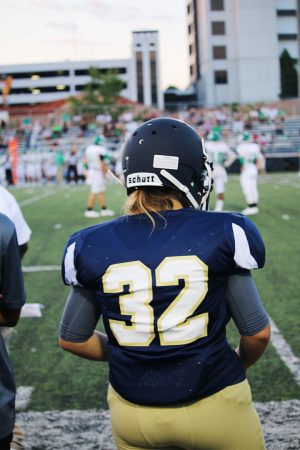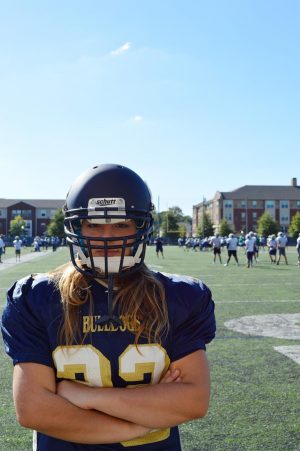Into the Open Field
Soto joins a football 'brotherhood'
November 15, 2017
Students shout her name and wave signs of support for number 32. Three quarters pass and she still isn’t in the game. She waits, the nervous smile on her face mirroring the crowd’s anticipation. Midway through the fourth quarter, Coach Felton finally calls her over.
“Alright Coach, I need to know: do I just run at them?” Chloe Soto said.
Knowing one week is hardly enough to learn the intricate and tough sport of football, Coach Felton tells her to do her best.
Soto walks to midfield to check in for the next play. As she and fellow sophomore Jada Harris cross the white line on Decatur’s artificial turf to enter the game, the crowd roars.
“It was weird because we were all on the sidelines and then when we got on the playing field, everyone went crazy,” Soto said. “But it was only a two-foot difference.”
This “two-foot difference” between the field and the sideline no longer separates Soto from the team as a passive observer; instead, she becomes one of the first two girls to play for the Decatur football team.
Soto lines up as a linebacker for the subsequent play. The player opposite her on the North Atlanta offensive line hears Soto’s high-pitched voice, sees the makeup on her face and stands up. After a second, he returns to his stance.
“You’re a girl?”
Soto is pretty sure she was “laid out” on this first play, but “she didn’t waver away from the challenge and she did eventually make a tackle,” Felton said.
In this spring scrimmage against North Atlanta, Soto and Harris became the first girls to play for the football team in non-kicker roles. On Aug. 11 against Druid Hills, Soto became the Bulldogs’ first girl to do so in a regular season game.

Soto walked on Decatur’s field during every home game of her sophomore year, but not as a football player. She saw the football team play under the lights as a member of the Color Guard.
“I grew up on a football field, so I always thought everything about the field was calming and it’s really just beautiful,” Soto said. “When I was on Color Guard I was really excited to get on the field to do something. It doesn’t really matter what I do on the field if I’m down there.”
Entering the spring of her sophomore year, Soto knew she wanted to trade her flag and costume for a set of pads and helmet. At the same time, she wanted to do so with other girls by her side. In the spring of 2017, sophomore Jada Harris and junior Diman Dillard started spring workouts with Soto, but Harris stopped playing after the spring scrimmage and Dillard stopped after summer workouts.
When Soto told the coaches she wanted to play in the 2017 season, they decided to call the team into the locker room for a conversation.
“We wanted to make sure everybody understood the dynamic of the situation, because besides having to change in a different locker room, she’s equal to everyone else,” Felton said. “She’s just one of the players when she comes out here, nothing more, nothing less.”
Soto’s football experience though goes farther back than her new cleats and pads.
When she was five years old, her mother, Kat Briere, went to sign up Soto’s two older brothers for football, and took her along for the ride. Briere started filling out the paperwork to sign Soto up for cheerleading, but Soto asked a question that changed her life for the next few years.
“Mom, can I not cheer and just play football?”
Briere looked down at her daughter with a smile full of pride.
For one season, Soto was the only girl in Pop Warner football in the Manchester/Nashua, New Hampshire area.
Because her family moved away from New Hampshire, Soto didn’t put on a helmet again until April 2016. From fifth grade on she grew only one inch while boys around her sprouted up by a foot or more. She no longer has the crunching effect when she hits in high school football that she did in Pop Warner, she said. Standing 5’4”, she often comes home from practice with bruises on her hands that look like “neon-yellow highlighters.
“My bruises have gotten so bad where people have come up to me and my friends to make sure I wasn’t getting beaten at home,” Soto said.
Though Soto’s legs and arms are battered and bruised she remains resilient.
“The players have never given me a reason to think about quitting,” Soto said. “The pain they cause, what they say or how they act have never affected [my attitude] towards football.”
While she may hear the occasional, “yo, there’s a girl,” from opposing players, Soto said she’s never felt disrespected by other athletes. On the other hand, she remembers students and fans from another high school in an early-season game coming down before the game to watch her warm up. While this adds a bit of pressure, it doesn’t really bother her.

“I don’t really care actually,” Soto said. “I don’t do it for the shock of the other people, but then again you kind of expect them to be shocked. It’s rare. I can’t imagine there are many other high school teams in Georgia that have seen a girl playing football.”
Soto’s decision to join the football team represents the continuation of a larger nationwide trend of increasing female participation in high school football. The number of girls playing high school football in the United States has more than doubled from the 2008-2009 season to almost 2000 in the 2015-2016 season, according to data from the National Federation of State High School Associations (NFHS) published in a Business Insider article. Soto, however, still thinks her experiences are rare.
“The first question that I get now from people who don’t know me but know of me is, ‘are you the girl that plays for Decatur?’”
While Soto is the first girl to play for Decatur’s football team in a non-kicker role, she isn’t even the first woman in her house to play the traditionally male-dominated game.
Soto’s mother, Briere, played for the New Hampshire Freedom, a semi-professional women’s football team, from 2002-2004.
“As a female, it’s an experience that we don’t have many opportunities to have, so it gave me a whole new sense of inner self-empowerment,” Briere said.
One frigid night in Manchester, Soto waited for her mom to finish with the Freedom. As she sat huddling for warmth, multiple coats covering her, she looked up at the lights and fell asleep. Practice finished, Briere’s teammates took back their coats and Briere carried Soto to the car. Cradled in her mother’s arms, Soto watched the lights.
“I don’t know why but I’ve always thought they were really beautiful,” Soto said. “Now it’s a real treat to see [them] when you’re walking off the field. You get the sense of home and joy.”
In her games under the lights, Briere also played running back and wore the number 32, but doesn’t think she influenced Soto’s decision to play football again. In fact, she was even a bit hesitant to let Soto play this year.
“When Chloe came home and told me she didn’t want to be on Color Guard and wanted to play football, I thought maybe she was having some issues with consistency because she loved Color Guard,” Briere said.
Soto originally approached Coach Scott Jackson about playing in the 2016 season, but was told that she would only be allowed to play kicker. The following year, she found out that Cody Cory was taking over as head coach and ran to his office to see if she could now play as a running back. He told her to come to tryouts and Briere said Soto came home that day with an excited smile on her face.
While Soto hadn’t played football since first grade, most of the boys on the Decatur team have played all of their life. This lack of experience combined with the physical differences of male and female muscular makeup worried Kat.

“I don’t know if I’d want to be hit by those guys and I’ve played before,” Briere said.
Soto’s persistence and love of the game, as well as the constant support of the Decatur coaches, have made Briere completely comfortable with Soto playing this season.
“The Decatur High coaches have done a phenomenal job at not putting Chloe in unnecessary dangerous situations,” Briere said. “They’re really smart about her safety.”
Felton coached the Atlanta Phoenix, a women’s professional football team, and felt these experiences translated right into helping Soto become part of the Decatur team.
“The fact that you’re not going to be treated differently has helped [Chloe] roll with the situation,” Felton said.
“I think some people really enjoy the aggression, the contact, the hitting, the crunching and the crushing and the team spirit,” Briere said. “But I think Chloe really enjoys feeling like she’s a part of that team.”
Soto doesn’t know whether she’ll appear in many varsity games this season, and she’s content with that.
“Obviously I want to be out on the field and I would give a lot to be out there on Friday nights, but at the same time I really trust the coaches and I’m not going to try to pull something to get on the field,” Soto said. “Even if I never touch the field I would still be happy.”
She does plan, however, on playing under the lights again next season, as a senior. Friday nights for Chloe Soto no longer bring flags and free third quarters but helmets, pads and lights.
“I was just looking for something different and fun and I wanted that sense of community and brotherhood,” Soto said. “Then I realized that football is pretty awesome.”

